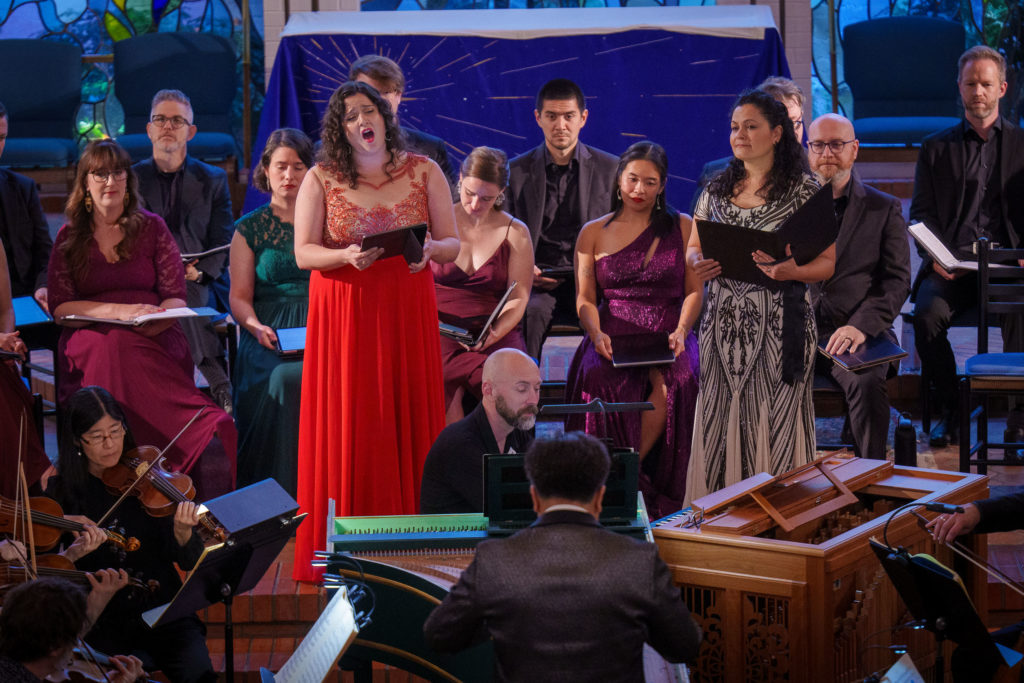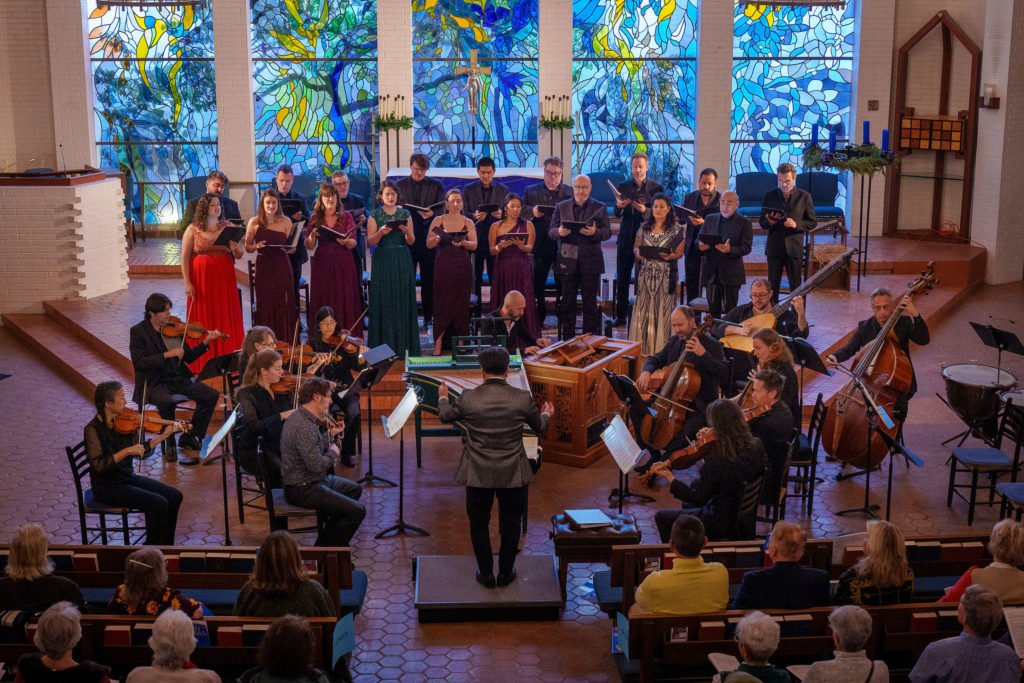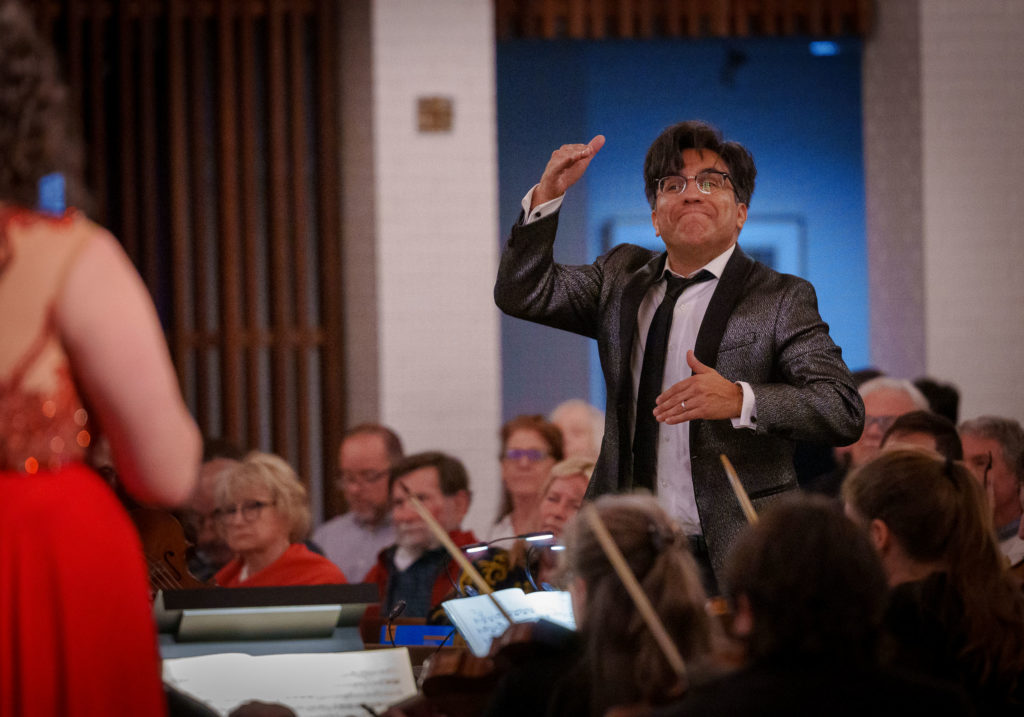Bach Collegium San Diego’s Transcendent ‘El Mesías’ in Point Loma
On Sunday at All Souls’ Episcopal Church in Point Loma, Music Director Ruben Valenzuela and his Bach Collegium San Diego brought their ground-breaking El Mesías back to San Diego. In March, 2022, Valenzuela premiered this newly commissioned Spanish language translation of George Frideric Handel’s beloved oratorio Messiah, performing it twice in San Diego County and a third time in Tijuana.
When I encountered the Bach Collegium’s El Mesías at The Conrad last spring, I was highly impressed how successfully Mario Montenegro’s translation and Javier Carillo’s deft musical adaptation of the new text worked. In fact, the sonic advantage of the Spanish language pure vowels and the elegant fit of the Spanish text to the composer’s melodic style actually improved the oratorio at nearly every turn! At The Conrad, the Bach Collegium’s performance of this “new” work clearly matched its reliable high standard, and the response of the audience was nothing less that rapturous.Based on last year’s performance of El Mesías, I approached Sunday’s Bach Collegium concert with high expectations. But I was unprepared for overwhelming emotional impact this year’s performance made. Under Valenzuela’s vigorous, assured direction, the chorus of a mere 18 voices provided sustained, often ecstatic brilliance; the soloists unfolded probing arias replete with dramatic yet pellucid fioritura, and the orchestra’s rich sonority and compelling focus propelled the oratorio to unexpected depths. And heights.
Tenor soloist Jacob Perry, new to the Bach Collegium by my recollection, set an enviable standard in the work’s opening aria “Cada valle será elevado” (Every Valley). His richly ornamented lines floated gracefully over the strings, filling the church with irresistible exultation. In the oratorio’s section describing the Passion of Jesus, Perry’s radiant tenor eloquently plumbed the pathos of the aria “Mirad, decid” (Behold and See). When it comes to hurling recitatives with frightening power, baritone Mischa Bouvier inhabits a rare high echelon. He judiciously meted out that power, however, in the oratorio’s climactic aria “Trumpeta anunciad” (The trumpet shall sound) expanding the dynamic level of its fanfare signature theme each time he repeated it—in tandem with Kathryn Adducci’s gleaming descants on natural trumpet—until they attained a bold fortissimo that truly shook the rafters.Delivering the angelic message to the shepherds in that marvelous cluster of recitatives in the opening section of the oratorio, Estelí Gomez used the bright edge of her majestic soprano to create a sense of joyous alarm. But in arias such as “Cantad alegres, Oh hijas de Zión” (Rejoice greatly, O daughter of Zion) and “Yo śe que mi redentor vive” (I know that my Redeemer liveth) she cultivated more lustrous, shimmering lines that she elaborated with arresting cadenzas, a sophisticated aspect of performance practice that the Bach Collegium has made its calling card.

(l. to r.) Soloists Estelí Gomez, Michael Sponseller (at harpsichord) & Cecilia Duarte (photo (c.) Gary Payne]
With her suave legato and creamy mezzo-soprano, Cecilia Duarte excelled in deeply reflective arias such as “Él fue humillado” (He was despised) and “Mas ¿Quién resistir podrá su llegada?” (But who may abide the day of His coming?) although when the text called for fire, she had ample fuego to dispense. In last year’s El Mesías, Andrew Padgett sang with the bass section, but this year as soloist he employed his commanding bass baritone to give illuminating definition to the haunting aria “El pueblo que estaba en tinieblas” (The people that walked in darkness).
Countertenor Jay Carter’s suavely navigated the sparking fioritura of “Oh tu que anuncias la nueva de Zión” (O thou that tellest good tidings to Zion) and with tenor Perry offered the an impassioned duet in the oratorio’s final section “¡Morir, no! Morir ya no es el fin” (O death, where is thy sting?).
To most audiences, the heart of any oratorio is the chorus, and from the glorious waves of sound that poured forth in El Mesías’ ebullient opening “Y la gloria de Dios será mostrada” (And the glory of the Lord) to the solemn contrapuntal splendor of its closing “Amén,” the Bach Collegium chorus under Valenzuela’s direction has never sounded more compelling. For example, the vibrant sonority of chorus in the opening salvo of the second section, “He aquí el Salvador” (Behold the Lamb of God) underscored and enriched its bold harmonic progressions. And although Valenzuela chose for the most past brisk choral tempos, he scrupulously maintained a clarity of texture that allowed the audience to savor Handel’s strong dissonances that so acutely interpret the text.
The Spanish translation of the familiar chorus All we like sheep have gone astray, does not mention sheep, but rather alludes to the Lord’s reuniting his scattered: “Mas el Señor nos congregó y reunidos.” Nevertheless, I couldn’t help but imagine rampaging sheep while listening to Valenzuela’s fiery drive through that chorus.
Equal in number to the chorus, the Bach Collegium’s period orchestra—strings with natural trumpets and a beefy continuo section—elegantly balanced the singers. For this El Mesías, Valenzuela added theorbo to the continuo section, and John Lenti’s articulate, percussive twang of his bass lute sharpened the attack of the continuo line. Valenzuela added the theorbo to the a cappella portions of “Por Adán morimos” (Since by man came death), and Lenti’s unexpected assertive strumming of the theorbo heightened the drama of that chorus. Associate Music Director Michael Sponseller worked his dependable keyboard artistry on the harpsichord for arias and recitatives, quickly turning to the chamber organ to provide proper foundation for the choral movements. Concertmaster Martin Davids’ strings offered a more unified ensemble–at times quite lustrous–for this El Mesías performance, and Davids added sensitive violin obbligato solos to several key arias.
This astonishing version of Handel’s El Mesías has just been published by the well-known music publisher of choral music GIA Publications. In his introductory note to this new edition, James Jordan, Director of Choral Studies at the Westminster Choir College of Rider University, wrote, “in all ways El Mesías is more vocally friendly to singers. My singers loved singing this edition . . . while Messiah can be vocally strenuous in English, my singers never tired of singing this version.” I would continue Jordan’s observation: especially in parts of the country where Spanish is the second language, audiences will not tire hearing this compelling El Mesías.
The Bach Collegium San Diego presented Handel’s oratorio “El Mesías” on December 10, 2023, in All Souls’ Episcopal Church, San Diego. The work will be repeated on December 12, 2023, at CECUT in Tijuana, Baja California.

Ken Herman, a classically trained pianist and organist, has covered music for the San Diego Union, the Los Angeles Times’ San Diego Edition, and for sandiego.com. He has won numerous awards, including first place for Live Performance and Opera Reviews in the 2017, the 2018, and the 2019 Excellence in Journalism Awards competition held by the San Diego Press Club. A Chicago native, he came to San Diego to pursue a graduate degree and stayed.Read more…



I feel sorry for those traditionalist who demurred attending because they are wed to Handel’s biblical English version.
They missed a stunning, eye and ear opening experience. Kudos to Ken Herman for his detailed and, as usual, insightful comments. If singers tell us they love performing the work in Spanish, the ravishing and powerful result, replete with musical nuance, should be no surprise.
I agree – the detailed account is mesmerizing – it narrates a stunning – forward looking- inclusive -exciting experience for today.
Just what our grandmasters would have wanted. Knowing and having worked with many of the people involved and the venue – made the review especially meaningful for me. Perhaps we can bring it across the country! There are audiences for this.